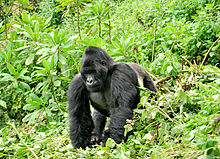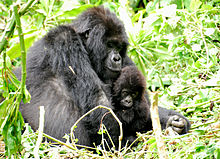
Back Gorilla beringei AN غوريلا شرقية Arabic غوريلا شرقيه ARZ Yiwol (Gorilla beringei) AVK Şərq qorillası Azerbaijani Източноконгоанска горила Bulgarian Goril·la oriental Catalan Малхбален горилла CE Gorilla beringei CEB Gorila východní Czech
| Eastern gorilla[1] | |
|---|---|

| |
| Male | |

| |
| Female with infant | |
| Scientific classification | |
| Domain: | Eukaryota |
| Kingdom: | Animalia |
| Phylum: | Chordata |
| Class: | Mammalia |
| Order: | Primates |
| Suborder: | Haplorhini |
| Infraorder: | Simiiformes |
| Family: | Hominidae |
| Subfamily: | Homininae |
| Genus: | Gorilla |
| Species: | G. beringei
|
| Binomial name | |
| Gorilla beringei Matschie, 1903
| |
| Subspecies | |

| |
| Eastern gorilla range | |
The eastern gorilla (Gorilla beringei) is a critically endangered species of the genus Gorilla and the largest living primate. The species is subdivided into two subspecies. Grauer's gorilla, formerly known as the eastern lowland gorilla (G. b. graueri) is more populous, at about 3,800.[3] The mountain gorilla (G. b. beringei) has only about 880. Illegal hunting of these gorillas are the reason why they may go extinct.[4][5]
- ↑ Groves, Colin (2005). Wilson, D. E.; Reeder, D. M. (eds.). Mammal Species of the World (3rd ed.). Johns Hopkins University Press. pp. 181–182. ISBN 0-801-88221-4.
- ↑ Plumptre, A.; Robbins, M.; Williamson, E. A. (2016). "Gorilla beringei". IUCN Red List of Threatened Species. 2016. IUCN: e.T39994A17964126. Retrieved 5 September 2016.
- ↑ "Gorillas on Thin Ice". United Nations Environment Programme. 15 January 2009. Archived from the original on 18 May 2016. Retrieved 19 May 2010.: "The Eastern Lowland Gorilla population in the DRC has plummeted dramatically over the last 10 years, with probably only about 5,000 of the formerly 17,000 animals remaining."
- ↑ "The Eastern Gorilla listed on Red List of Endangered Species by IUCN". CBSnews. AP. September 4, 2016. Retrieved September 4, 2016.
- ↑ "Four out of six great apes one step away from extinction – IUCN Red List". 4 September 2016. Archived from the original on 8 September 2016. Retrieved 21 June 2018.
